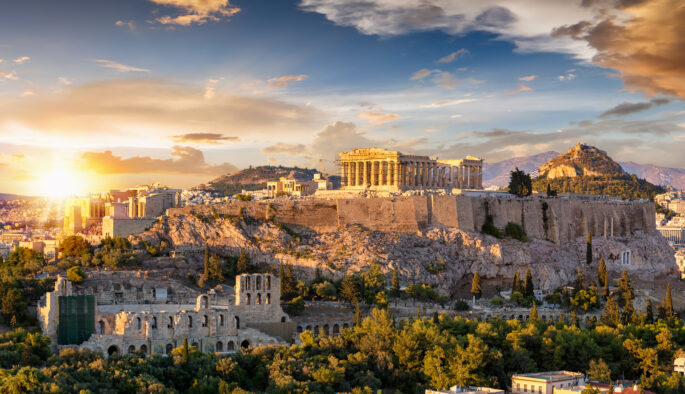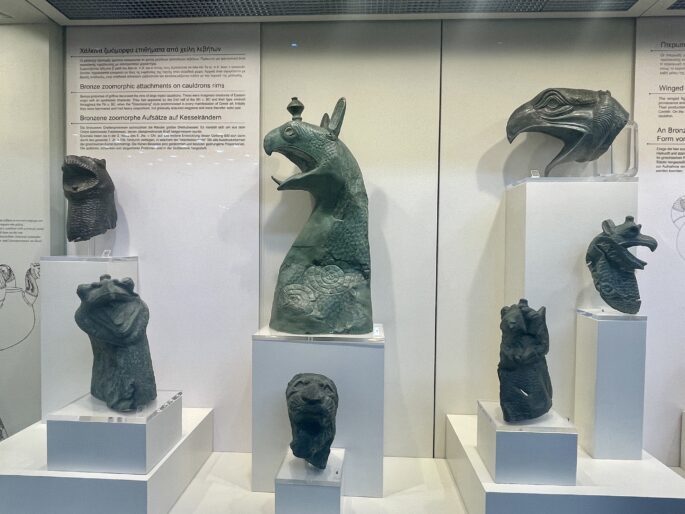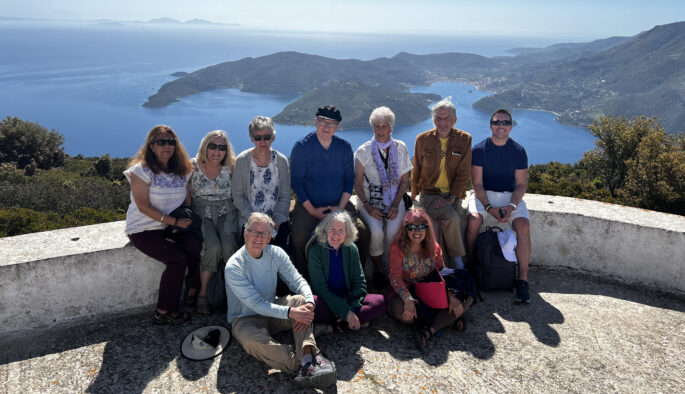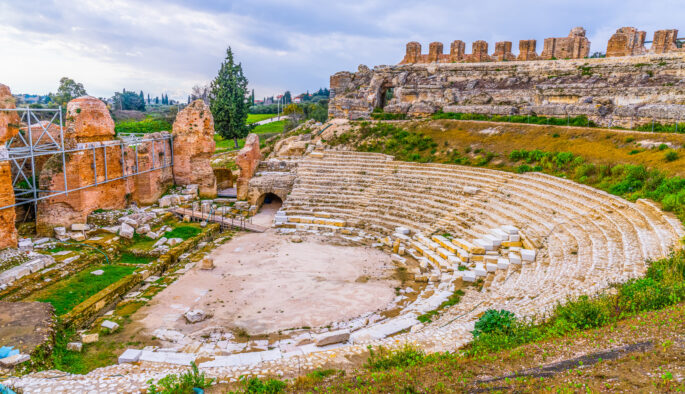
In the shadow of ancient temples and atop sacred hills, the Greeks of antiquity gathered to unlock the secrets of life, death, and the divine. Their mysteries—enigmatic religious rites and teachings—were a gateway to profound spiritual experiences, reserved for those willing to seek them out. From the mystic rituals of Eleusis to the cryptic teachings of Orphism, these ancient traditions were steeped in symbolism and shrouded in secrecy, designed to connect the human spirit with something far greater.
Though centuries have passed since the last torchlit processions wound through their sacred sites, the influence of the Greek mysteries is far from extinguished. Their echoes can still be felt in modern spirituality, psychology, and even the arts, reminding us that humanity’s quest for meaning is timeless. If this timeless allure captivates you, why not experience it firsthand? Join mythologist, author, and filmmaker Phil Cousineau on a journey through Greece’s myths and breathtaking landscapes to uncover these mysteries in their homeland in October 2025.
Prepare to journey through history and myth as we uncover the enduring legacy of the Greek mysteries—and how their wisdom might still illuminate our path today.
Unveiling the Mysteries: What Were the Ancient Greek Mysteries?
The Ancient Greek Mysteries were sacred rituals and teachings that offered participants profound spiritual transformation and a connection to the divine. Known for their secrecy, these rites were accessible only to the initiated and centered on themes of life, death, and rebirth.
The Eleusinian Mysteries, dedicated to Demeter and Persephone, symbolized the cycle of life and promised initiates a blessed afterlife. Through fasting, purification, and dramatic reenactments, participants experienced a journey mirroring Persephone’s descent into the underworld and return, offering hope and renewal. Similarly, the Orphic Mysteries explored the soul’s immortality and emphasized living a pure, introspective life to prepare for liberation from reincarnation.
While their exact details remain a mystery, these rites transcended social boundaries and provided a deeply transformative experience. At their heart, they offered not just understanding but a personal connection to the divine—insights that continue to resonate today.
Symbols and Secrets: The Hidden Language of the Mysteries

The Ancient Greeks conveyed their wisdom through a rich tapestry of symbols, rituals, and myths, designed to communicate truths that transcended words. These symbols, often veiled in allegory, invited initiates to uncover deeper meanings through personal reflection and spiritual experience. By keeping their teachings hidden behind metaphors and secrecy, the mysteries ensured that their insights were accessible only to those ready to seek them.
In the Eleusinian Mysteries, symbols like grain and the pomegranate represented life’s cyclical nature, death, and renewal. Rituals such as drinking kykeon, a sacred brew, blurred the boundaries between the physical and divine, highlighting the unity of body and soul. Similarly, the Orphic Mysteries used imagery like the lyre, symbolizing harmony between mortal and divine, and the serpent and egg, reflecting themes of creation and the eternal cycle of life.
Through ritual reenactments, initiates became active participants in these symbols, bridging the gap between human and divine realms. This hidden language of the mysteries not only safeguarded their sacred knowledge but also created a deeply personal and transformative experience for each participant—one that continues to inspire spiritual seekers today.
From Antiquity to Modernity: The Mysteries’ Influence on Western Thought
The Greek mysteries, though ancient, have profoundly influenced the development of Western thought, particularly in philosophy, religion, and the arts. Philosophers like Plato and Pythagoras were deeply inspired by the mysteries, incorporating their themes of the soul’s immortality, the pursuit of higher truths, and the transformative power of knowledge into their teachings. Plato’s allegory of the cave, for example, mirrors the journey of an initiate moving from darkness into the light of understanding, a core theme in the Eleusinian Mysteries. These philosophical concepts laid the foundation for Western metaphysical and ethical traditions.
The mysteries also shaped early Christianity, which adopted similar themes of death, rebirth, and salvation. Rituals like baptism and the Eucharist echo the initiatory practices of the mysteries, emphasizing purification, spiritual renewal, and communion with the divine. Christian theologians such as St. Augustine acknowledged the influence of mystery traditions on the early Church, blending their symbolism and rituals with emerging Christian theology. This convergence helped shape the spiritual framework that continues to underpin much of Western religious thought.
In the arts, the mysteries’ influence is evident in literature, drama, and visual culture. The dramatic reenactments of myth central to the mysteries inspired Greek tragedies, with playwrights like Sophocles and Euripides exploring themes of fate, transformation, and divine justice. Later, Romantic poets and modern authors drew on the mysteries for inspiration, using their rich symbolism to explore existential and spiritual questions. Today, the mysteries’ themes remain a source of fascination, reflecting humanity’s enduring quest for meaning, connection, and transcendence.
Living the Legacy: What the Greek Mysteries Teach Us Today
The Ancient Greek Mysteries continue to resonate because their central themes—self-discovery, transformation, and the search for meaning—are timeless. At their heart, the mysteries taught initiates to embrace the cycles of life, death, and rebirth, both physically and metaphorically. In a modern context, this serves as a reminder to accept change as an essential part of growth. Whether facing personal challenges, navigating transitions, or seeking clarity, the mysteries inspire us to approach life with openness and a willingness to transform.

The mysteries also emphasized the interconnectedness of the human and divine, encouraging participants to look beyond the material world and connect with something greater. This perspective is especially relevant in today’s fast-paced, technology-driven society, where people often feel disconnected from nature, spirituality, and their inner selves. Practices inspired by the mysteries, such as mindful rituals, meditation, or connecting with mythological archetypes, can help cultivate a sense of purpose and belonging in our daily lives.
Lastly, the mysteries remind us of the power of community in spiritual and personal growth. Initiates shared their transformative journeys with others, creating a bond of mutual understanding and support. In modern times, this can inspire us to seek meaningful connections, whether through shared rituals, storytelling, or collective acts of introspection. By embracing the lessons of the Greek mysteries, we can deepen our relationship with ourselves, others, and the world, keeping their timeless wisdom alive in our lives today.

If this blog post has sparked your curiosity about the enduring mysteries and myths of Ancient Greece, why not experience them firsthand? Join mythologist, author, and filmmaker Phil Cousineau in October 2025 on an extraordinary odyssey through Greece’s timeless landscapes and legendary heritage. From the ancient wonders of classical Greece to the vibrant modern Mediterranean, this journey offers a unique opportunity to explore the art, beauty, and passion that continue to shape our world today.
Step into the stories of gods, heroes, and philosophers as we traverse Homer’s “wine-dark sea,” visit iconic world heritage sites, and savor the splendor of Greek culture. Don’t miss this chance to uncover the secrets of Greece’s glorious past while reveling in its breathtaking present. Register now and embark on an unforgettable adventure!

